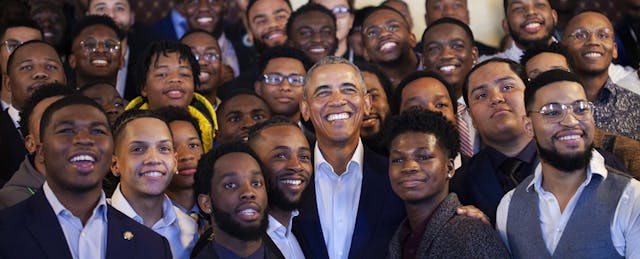“We can all be surrogate fathers. We can all be big brothers.”
Former President Barack Obama spoke those words in front of thousands at the My Brother’s Keeper (MBK) Alliance National Gathering in the heart of Oakland, Calif. on Tuesday. The gathering marked the fifth anniversary of the program’s existence, which was founded during Obama’s presidency in 2014.
An initiative started by President Obama following the death of Trayvon Martin in 2012, MBK originally aimed to encourage more support of young men of color, attempting to fix opportunity gaps with support networks, mentorship and internship or job experiences.
During the week’s two-day event, sponsored by the Obama Foundation, speakers ranging from activist Sybrina Fulton, Trayvon Martin’s mother, to Black Panther director Ryan Coogler took to the stage to discuss the importance of community, brotherhood and the realities of race relations in the United States.
Obama shared that, since MBK’s creation, more than 250 MBK communities have developed and exist as part of the movement across the United States. Recently, the Foundation announced $5 million in grants to organizations supporting MBK’s mission across the country.
The investment comes as no surprise. Obama indicated early on that the Foundation will target its support towards local community work—instead of depending on support from the federal level.
“I lost my job, so I had less immediate impact on federal programs,” he started, garnering chuckles across the crowd. “But we still have the community programs, and I said, we’re gonna keep [MBK] alive. Thanks to the outstanding work of local communities, that spirit of investing in boys and young men of color has continue and thrived.”

Every Boy Needs a Mentor
One recurring theme expressed by many of the panelists was the continued need for mentorship for young men of color—both inside school and outside of school.
“I was fortunate enough to have a strong role model in my life—my father,” shared Stephen Curry, point guard for the NBA’s Golden State Warriors. “When I was young, it was the consistent presence he had that gave me more confidence around how I carried myself in the classroom, at home.”
But it’s never too late to receive support, as singer John Legend made clear—even when you are incarcerated. “I’ve have family members that have gotten caught up in the system,” the singer shared while moderating a panel. “We are the most incarcerated population in the world. We make up 5 percent of the world’s population, but 25 percent of the prison world.”
To support these men in prison, Legend has invested in Unlocked Futures—a 16-month accelerator for currently or formerly incarcerated individuals who are interested in launching entrepreneurial ventures.
Investing in Technical Schools and Cultural Awareness
Several panelists also stressed the importance of continuing to invest in the education organizations that can lead to jobs and identity development.
Lucia Kay McBath, a Georgia Congresswoman and mother of slain 17-year-old high school student Jordan Davis, spoke specifically to the need to invest in technical institutions, not just colleges and universities. It’s “a matter of economics,” she expressed:
“At one time, Jordan wasn’t sure he wanted to go to college. It’s key that we invest in our technical institutions, trade schools. It’s a matter of economics. If someone decides to be a tradesman, that man is keeping the economy strong… these are things we always need to be considering.”
NACA Inspired Schools Network founder Kara Bobroff later resurfaced this topic, saying that one of her biggest goals is to make sure that every young man in indigenous communities is ready for college and beyond, but also added the importance of also educating students on their histories and communities.
“My hope for you,” she told the crowd of young men of color, “is that you stay rooted, grounded in your language and culture, and have a positive impact on your community.”
A Call to Action
Though many of the panels spoke to the future of MBK, several speakers took the opportunity to share their hopes for all of the young men in the room—including Black Panther actor Michael B. Jordan, who called upon his fans to see technology and art as a way to shift narratives and gain power. “Technology allows you to go out, be storytellers, shoot a short film,” he said. “You can create—you have all the tools you need to create.”
But he wasn’t the only one bestowing a call to action upon the room.
Fulton then said to the crowd, turning her head from one side of the room to another: “Although Trayvon is not here, I want [everything] for you. I want you to be leaders, and not followers. You have everything that you need to succeed. Stand up. Take your place. You stand on our shoulders, and we are here for you.”


